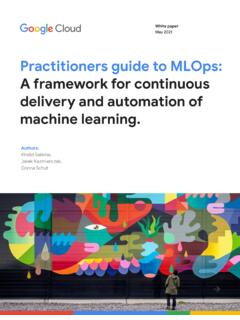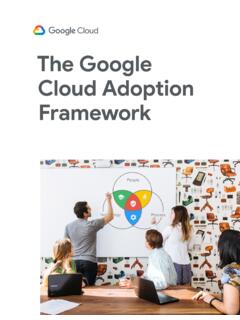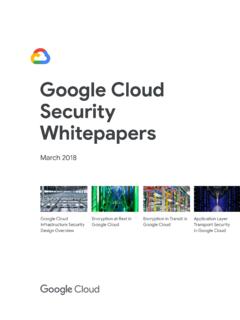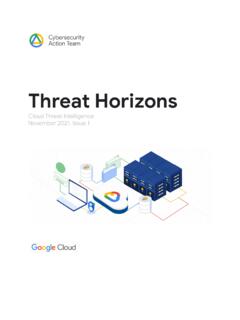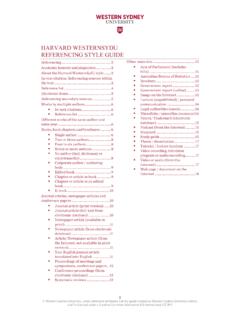Transcription of Supporting Employee Mental Health and Well-being
1 Supporting Employee Mental Health and Well-being Benefits@Google Overview We are all learning how to cope with a global crisis. Each day, there is a new challenge that we may encounter. Here are a few things that Google is doing to help our people take care of their Mental Health during these difficult and uncertain times. General COVID-19 Coping Recommendations Maintaining routine: As much as you can, stick to your daily routine activities like enjoying your morning coffee. Take a shower and give yourself time to get ready before work. This can provide us with a sense of comfort in uncertain situations. Managing stress: We are all navigating varying levels of stress during this time. It s important for us to take it easy on ourselves, recognize that this is an unprecedented time, and remember that it s okay to not always be okay. That being said, we can learn how to better manage our stress through practice. Read more about the CDC s tips on how to manage stress during covid-19.
2 Getting proper rest: As always, it is important to maintain a regular sleep schedule. When our sleep is disrupted, it can impact our immunity, and can also make it more difficult for us to think clearly, manage our emotions, and make important decisions. See what Harvard Health says about the impact sleep has on our Mental Health . Additionally, here are some CDC tips for better sleep . Staying active: Being at home for extended periods of time, especially during a crisis, can take a toll on us. It is important for us to focus on our physical Well-being just as equally as we focus on other parts of our lives. Go for a walk, stretch, do an at-home workout physical exercise reduces stress and anxiety. Read more about the benefits of physical activity as provided by the CDC. Here are some tips from the World Health Organization on how to remain active during covid-19 . Supporting Employee Mental Health Promoting self care while WFH: Working from home can feel isolating, which is why it s even more important to take care of ourselves.
3 We encourage our employees to check in with themselves, connect with loved ones on a regular basis, stay active, make healthy nutrition choices, and keep up with a normal sleep schedule. Set wellbeing reminders on calendars throughout the day. It is often difficult to stick with new habits during stressful times, so start with simple things you enjoy that help you feel healthy and connected. Encouraging detachment (from work): Detaching from work during a non-work time (and when you choose not to be working) has always been part of our wellbeing culture. It is even more important now to maintain a clear separation between when we are focusing on work and when we choose not to be working. It s important to establish a routine to help you disengage from your work (whether it's for 20 minutes or 2 hours) to allow your mind and body to reset. Some Googlers have established a routine of neighborhood walks as a Mental commute before or after work. Some Googlers have taken advantage of our Carer s Leave Policy which provides more flexible working arrangements and additional time off for those who need to take care of a loved one.
4 Other Googlers are alternating "No Meeting Days" to make it easier and more predictable swapping off childcare. If you're using Google Calendar for work, customize your hours in your settings and meeting organizers will get a notification when they schedule a meeting outside of your indicated working hours or working days. At Google, we have seen more children, roommates, and pets popping into video Hangout meetings which are a great reminder for us to laugh and take a step back from work. Growing resilience: Resilience is our ability to respond to and recover from stress, which is essential in coping with a complex challenge, like a public Health crisis or a major disruption to daily life. Research shows that the skill can be grown, practiced and cultivated by our attitudes and behaviors. Over the past year, Googlers have participated in resilience trainings, led by our Well-being and Mental Health teams. The course teaches Googlers how to counter negative thoughts, identify daily habits that drain energy, and discover new ways to invest in physical and Mental recovery.
5 Participants also learn how to check-in on their daily (Thoughts, Energy, Attention), a simple activity using questions to identify common points of stress and effectively reframe our mindset in those moments. Googlers tell us they are also using the activity with their families and friends to check in on each other. Reminding teams to check in on each other: Finding new ways to maintain culture in a virtual setting can help promote social connectedness and establish safe spaces, even when we're apart. Recently, we launched an online Mental Health training to help managers be intentional about checking in on the Well-being of their teams, and to better understand the signs when team members are struggling. If you have Employee resource groups or mentoring programs, opt for virtual 1:1 or group "Office Hours over Google Meet to support community interaction and togetherness. For example, Googlers are continuing to look out for one another through our Mental Health peer-to-peer support network, called Blue Dot, which has set up virtual listening sessions for those in need of a sympathetic ear.
6 Knowing all your options for Mental Health support: In difficult times, it s okay to not be okay or feel like you aren t operating at your best. Over 75 percent of companies with 251-1000 employees offer Employee assistance programs (EAPs), and many now offer virtual care services. If your company has an EAP provider, you and your dependents can access resources like free and confidential emotional Well-being guidance, as well as free expert information on other topics to help you cope with stress, anxiety, depression, relationship issues and addictions. If your company doesn t have an EAP, check with your Health insurance provider on the benefits available to you for Mental Health , behavioral Health , or substance-abuse coverage. Understanding all of your options to get the help you need is now more important than ever. Positioning Managers & Leaders Checking in on wellbeing during 1:1s: Checking in with each other is important, now more than ever. It can be helpful to allot 5-10 minutes at the beginning of your 1:1s to just check in and ask each other how you re doing.
7 This will enhance connection and make you feel more comfortable and open to talking about the elephant in the room. Checking in with each other during team meetings: Similarly, it s important to open up conversation with your teams in team meetings. Check in with your team regularly. Ask each other how you re really doing, see if there are ways for teammates to help each other out, and be respectful of each other s experiences. This can enhance psychological safety and build better working relationships among the team. Quartz at Work outlines 20 questions to ask instead of How are you doing right now? Virtual team-building: It s during these times that we really see people come together and help each other. Just because we are not in the office doesn;t mean that we should discontinue our efforts to connect with each other and build great relationships across the team. Do something fun! Set up a weekly team challenge, film a team lip sync video to your favorite song, or do office trivia.
8 Be creative! We all need a little bit of positivity in our lives. Manager & leader peer communities: Provide forums for your managers and leaders to share best practices with one another through this trying time. We re all learning how to cope with this together. Getting through this isn t one size fits all, but we can take what others are doing, shift it to make it our own, and make it work for us.

